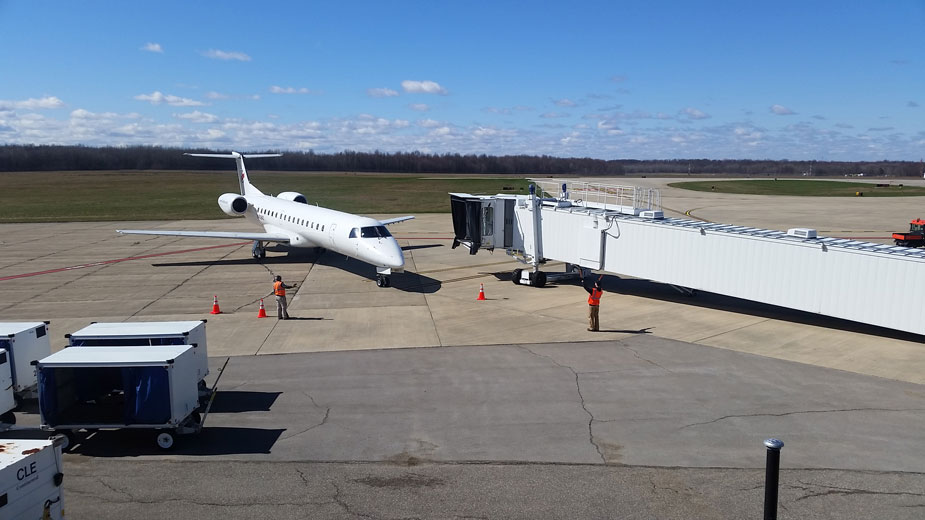WRPA Pulls Plug on Subsidizing Chicago Flights
VIENNA TOWNSHIP, Ohio – The Western Reserve Port Authority will no longer subsidize Great Lakes Jet Express’ daily passenger service to Chicago, effectively putting the carrier out of business at the Youngstown Warren Regional Airport — although how soon isn’t known.
The decision was made today in a unanimous vote of the port authority board of directors and based on low passenger counts, how fast the carrier was burning through startup subsidies and its failure to secure interline agreements with airlines that fly out of O’Hare International Airport, said John Moliterno, executive director of the port authority, which operates the airport.
“No one is happy about this : not the airport, not the port authority and not the company,” he said.
“We just determined as fiscal good stewards of the public dollars, we can’t continue to subsidize what has turned out to be an unprofitable venture,” Moliterno said.
As of Wednesday, Great Lakes had billed the port authority for $353,000 in startup expenses, according to Moliterno, and more invoices will be coming. WRPA reimburses Great Lakes from a $480,000 local match fund that’s tied to a $1.2 million revenue guarantee from the U.S. Department of Transportation, which then picks up 65% of the total costs.
“The numbers were OK going to Chicago. The problem was they needed 40% to 45% of their passengers to go past Chicago to make the airline profitable, and because of a variety of problems with interline activity and connectivity, people could not book further flights,” Moliterno said.
He declined to speculate on why airlines that fly out of O’Hare did not sign connection agreements with Great Lakes Jet Express. Only American Airlines and Delta did so, Moliterno said, which meant passengers coming from Youngstown had to either connect on an American Airlines flight or pick up their baggage, go back through security and begin the check-in process over again.
The lack of interline agreements, “That’s something we didn’t know. We were told this was going to be seamless. We would not have entered into this had we known that was not the case,” Moliterno said.
Instead, after spending tens of thousands of dollars to market the Great Lakes service, “We had phone call after phone call from people who wanted to connect but couldn’t,” Moliterno said. “It became very frustrating. Correspondingly, ridership went down to the point that neither the airline or the port authority thought it would be feasible for us to continue at this point.”
A news release issued this afternoon by the port authority said “bookings had increased steadily through the month of July on the strength of promotional fare rates [but] passenger reports from July 1 through Aug. 16 show that only 11% of total passengers were booking connecting flights through O’Hare. Load factors for the daily service have averaged 28%. They needed to be significantly higher to eventually generate sufficient revenue to be self-sufficient.”
Great Lakes Jet Express began its passenger service July 1 after its parent company, Aerodynamics Inc., was involved for more than a year in back-and-forth discussions with federal regulators over its financial stability and ownership.
“We realized they had their ups and downs,” Moliterno said. “We let the Federal Aviation Administration and the Department of Transportation make their decisions. They were capable of flying, and we were rooting for [Aerodynamics] as much as they were rooting for us.”
ADI, incorporated in Michigan, has a corporate office in Beachwood and an operations office in Kennesaw, Ga. It is owned by John and Janet Beardsley, who also own SeaPort Airlines Inc., which does business as Wings of Alaska.
Mickey Bowman, ADI chief operating officer, said in an email to The Business Journal that his company “is disappointed that the board has made this decision but we understand their direction given the ridership the service is experiencing. We have a contract with the WRPA that requires them to provide ADI a 90-day notice for a service cancellation.”
Bowman said he “committed to Dan Dickten [the airport director of aviation] and John Moliterno that [we] would work with our vendors to see if an earlier termination date might be possible. ADI had to commit to contracts with service providers such as Winner Aviation in Youngstown, and each of those contracts require a notice period. Were we to fly through the full 90- day notice period, our last flight would be Nov. 14, 2016, on the route. I believe that we will likely be able to do somewhat better than that, but it will take us a day or two to work through that process and finalize the actual date for service termination.”
Bowman noted that on Monday ADI “inaugurated new scheduled passenger service between Watertown and Pierre, S.D., to Denver.”
When the company launched its Youngstown flights, It had an agreement with United Airlines but that ended two weeks into the service. United is the No. 11 operator at O’Hare, carrying 60% of the passengers who depart from the airport.
In an email to The Business Journal, Dickten said, “Load Factors in July were only 31% and in August thus far even less at 23%. …Without the right interline agreement in place for connectivity, the service will not sustain itself. So we have decided to terminate the service before more funds are lost. We are continuing to entertain service with other airlines with the appropriate connectivity.”
In its news release, the Western Reserve Port Authority said factors other than the lack of connecting agreements impeded the success of Great Lakes, among them “confusion with online booking” at third-party booking websites.
“A longer-than-expected time frame to get reservation systems in place made it difficult for passengers to book flights in July, resulting in YNG missing out on the year’s busiest month for air travel,” the release stated. “Originally, the flights were expected to launch in April, which would have given travelers a few months ahead of time to book their flights for summer trips. Typically, travelers plan their trips as far ahead as possible. Pushing the launch date to July 1 reduced the window for travelers to book flights from YNG.”
Nevertheless, “passenger reviews of the flights” were good, said Dickten. “Both public passengers and local businesses have been very supportive of this local travel option.”
Youngstown passengers who booked flights with Great Lakes JetExpress are entitled to a full refund and should call the carrier at 307 432 7265 or by email refunds@flygreatlakes.com, the port authority said.
“It is important for us to get message out that we know this didn’t turn out the way we wanted to, even though we did what we needed to do,” Moliterno told The Business Journal.
“Just because this wasn’t successful, we won’t stop trying to bring additional passenger flights to the airport.”
Pictured: First flight to Chicago, July 1.
Copyright 2024 The Business Journal, Youngstown, Ohio.


